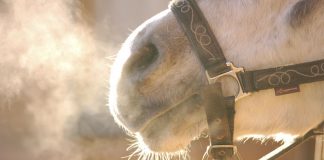 |
Only a short time after Japan’s Thoroughbred racing industry came to a standstill due to an outbreak of equine influenza among racehorses there, Australian authorities said Monday they now suspect hundreds of racing Thoroughbreds there may have contracted equine flu.
The head of Racing New South Wales, Peter V’Landys, has put the total potential cost at more than one billion dollars ($833 million U.S.). The full impact of the horse flu outbreak is still being assessed, but one economist said it would be felt across the country.
The Australian government Monday extended a nationwide ban on all racing and transport of horses until Friday in a bid to contain the spread of the virus which has infected horses in New South Wales and Queensland.
In New South Wales, where the virus first appeared in the state capital Sydney on Friday, the ban is open-ended because 51 horses have tested positive for the disease and a further 415 have displayed symptoms.
The outbreak is extremely problematic for financial reasons, but loss of horse life is also furthering the concerns if the disease spreads.
Equine influenza can be fatal in horse populations like New Zealand’s and Australia’s. Horses in these countries have not been previously exposed to some viral infections, says Joe Mayhew, Massey Professor of Equine Studies at the Institute of Veterinary Animal and Biomedical Sciences at Palmerston North in New Zealand. He says the outbreak of influenza in Australian horses needs to be taken seriously by New Zealand because of the close relationship between the Thoroughbred racing and breeding industries.
“Many of the horses that come into New Zealand from other countries do so via Australia,” professor Mayhew says. “MAF [Ministry of Agriculture and Forestry] Biosecurity here have done a very good job in advising the public and the veterinary profession what to do, in closing down importation of stock from Australia and following up the horses that have come in since 1 August. The information from them is very sensible and very clear.”
However, he says there are misconceptions about equine influenza–that it is not fatal to horses and that Thoroughbreds are more susceptible than other horses. Outbreaks in naïve populations–those that have little or no previous exposure–have been fatal in several eastern European countries and South Africa, he says. This usually involves young or aged horses but can also happen in healthy, previously unaffected adult horses.
“There could easily be deaths [in Australia], particularly depending on which viral strain is involved. I expect there won’t be though because they would tend to have happened already with all the positive blood tests recorded.”
Because they often live in bigger groups and closer proximity than other breeds of horses, Thoroughbreds and Standardbreds may spread infection more readily, but because they tend to be very fit animals, are no more likely to suffer ill effects of the disease.
A fit horse that continued to be exercised or raced after exposure could easily end up with secondary illnesses like pneumonia.






This is awful. Any update to this article?